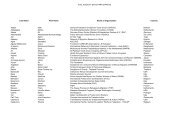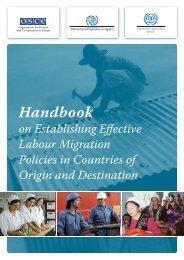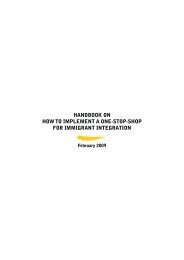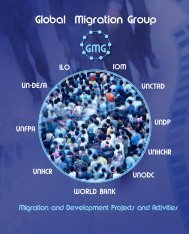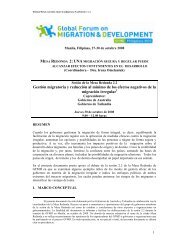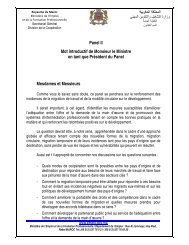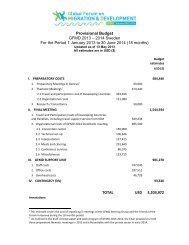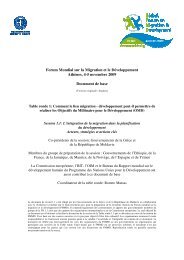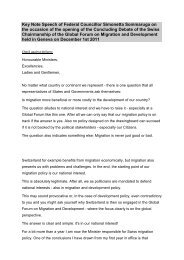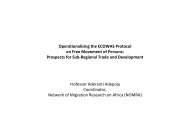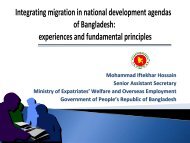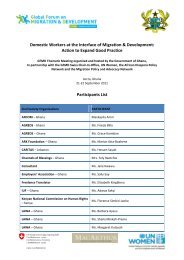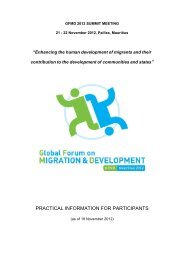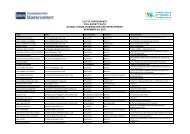1 Mauritius Second High Level Forum (HLF) Harnessing Diaspora ...
1 Mauritius Second High Level Forum (HLF) Harnessing Diaspora ...
1 Mauritius Second High Level Forum (HLF) Harnessing Diaspora ...
You also want an ePaper? Increase the reach of your titles
YUMPU automatically turns print PDFs into web optimized ePapers that Google loves.
<strong>Mauritius</strong> <strong>Second</strong> <strong>High</strong> <strong>Level</strong> <strong>Forum</strong> (<strong>HLF</strong>)<br />
<strong>Harnessing</strong> <strong>Diaspora</strong> Resources for Development in Africa<br />
Hotel Voila Bagatelle<br />
Mall of <strong>Mauritius</strong><br />
Bagatelle, <strong>Mauritius</strong><br />
June 14 – 15, 2012<br />
Agenda<br />
This forum is co‐organized by the World Bank and the Mauritian Chair of the Global <strong>Forum</strong> on<br />
Migration and Development (GFMD), both in follow‐up to the first <strong>HLF</strong> in 2008 and in support of<br />
the GFMD Roundtable Session 1.2 on Supporting Migrants and <strong>Diaspora</strong> as Agents of<br />
Socioeconomic Change.<br />
Objectives<br />
The objectives of the <strong>HLF</strong> are to provide a platform for:<br />
Taking stock of the practical actions African countries have taken to harness the<br />
resources of their diaspora for development since the inaugural <strong>HLF</strong> in 2008.<br />
Sharing lessons and insights on the key elements and building blocks of effective and<br />
promising diaspora engagement policies and strategies.<br />
Considering innovative products and tools offered by governments and the private<br />
sector that can facilitate efforts to increase the development benefits of diaspora<br />
resources, particularly remittances and investments.<br />
Charting a path to intensify efforts and energy towards sustained policy interventions<br />
and strategies to harness diaspora resources for improving development outcomes on<br />
the continent.<br />
Expected Outcomes<br />
The outcomes of the <strong>HLF</strong> would include some draft proposals for designing regional/country<br />
engagement policy frameworks and public‐private partnerships, products and services to<br />
leverage remittances, and create avenues for utilizing diaspora talents and skills in development<br />
programs in countries and regions of origin. Participants would also draw useful insights from<br />
shared experiences /practices; and consider a series of institutional reforms to support such<br />
policy frameworks, including involving diaspora and the private sector as partners in<br />
development, business and policy‐making.<br />
1
Expected Output: Report on regional/country diaspora engagement plans as input into<br />
Roundtable Session 1.2 of GFMD 2012 on Supporting Migrants and <strong>Diaspora</strong> as Agents of<br />
Socioeconomic Change under the overall chairmanship of the Government of <strong>Mauritius</strong>.<br />
Arrival Day: June 13<br />
01:00 pm Arrival and Registration<br />
(Participants receive materials as background reading for the event)<br />
Day One: June 14<br />
08:30 – 09:15 Session 1 ‐ Opening<br />
Brief Welcome and Participants Introduction including brief statements on<br />
expectations from the forum:<br />
Welcoming Remarks<br />
Host Government Official (Mauritian Chair of GFMD)(5 mins)<br />
Opening Statements<br />
World Bank Country Representative for <strong>Mauritius</strong> (5 mins)<br />
European Commission Representative (5 mins)<br />
09:15 – 9:25: Brief Overview of Agenda<br />
Kofi Anani, World Bank Africa <strong>Diaspora</strong> Program (10 mins)<br />
09:25 – 10:00: Session 2 ‐ Key Note Speeches: Challenges and Opportunities for harnessing<br />
<strong>Diaspora</strong> resources (50 mins)<br />
Chair: Mr. Rafael Munoz Moreno, Country Representative, World Bank, Africa Region<br />
Speakers:<br />
Mr. Paul‐Harry Aithnard, Head of Research Group, Ecobank Transnational<br />
Incorporated (ETI)<br />
Mr. Ali Mansoor, Financial Secretary, Ministry of Finance and Economic<br />
Development (MOFED), <strong>Mauritius</strong><br />
These motivational presentations would set the tone for the forum discussions. They would<br />
highlight the challenges and opportunities for harnessing diaspora resources based on practical<br />
experiences of the endeavors of African countries. They would identify the issues to be<br />
discussed in the ensuing 2 days, including transfer of talent, skills and expertise; business and<br />
investment instruments; policy incentives and packages; and the institutional arrangements to<br />
underpin these, in particular between public and private partners. The roles and responsibilities<br />
of diaspora professional networks and related groups, business and investment fund managers,<br />
social entrepreneurs and philanthropists, governments, multilateral donor agencies and related<br />
organizations would be identified, as appropriate, to shed light on the partnership arrangements<br />
2
necessary to catalyze growth and development on the continent with African diaspora<br />
resources.<br />
10:00 – 10:15: Participants Remarks / Questions<br />
10:15 – 10:30: Coffee/Tea Break<br />
(A) STOCKTAKING AND REFLECTIONS<br />
10:30 – 11:25: Session 3 ‐ Stocktaking and Reflections on Country / Company Undertakings<br />
Moderator: Amb. Usha Dwarka‐Canabady, Ministry of Foreign Affairs, <strong>Mauritius</strong><br />
This session would involve brief case studies presented by African government representatives<br />
and private sector and industry experts of interventions that have engaged the diaspora in<br />
various facets of development, business, and investment undertakings. Particular emphasis<br />
would be on country and company strategies that capitalize and maximize opportunities while<br />
mitigating and overcoming the institutional, knowledge, resource, financial and logistical<br />
challenges associated with leveraging diaspora resources for growth and development. The<br />
government presentations would be followed by informed responses and suggestions from<br />
resource persons and industry experts, and interactive discussions with the participants.<br />
Speakers:<br />
Case 1: Mrs. Mary Mpereh, Principal Planning Analyst, National Development<br />
Planning Commission (NDPC), Ghana (10 mins)<br />
Case 2: Mr. Bakari Cisse, Director, Mali <strong>High</strong>er Education Project, Mali (10 mins)<br />
Case 3: Mr. Geoffrey Omondi, Ministry of Labour, Kenya (10 mins)<br />
Case 4: Mr. Mohammed Bernoussi, Secretary General, Ministry for Moroccans<br />
Living Abroad, Morocco (10 mins)<br />
Case 5: Mr. Tesfaye Wolde, Director, <strong>Diaspora</strong> Information and Research<br />
Directorate, Office, Ministry of Foreign Affairs, Ethiopia (10 mins)<br />
11:25 – 12:00: Session 4 – Comments on <strong>Diaspora</strong>‐led Initiatives in Africa and Outreach to the<br />
African <strong>Diaspora</strong> Community by the Private Sector/Industry/<strong>Diaspora</strong><br />
Discussants /Responders:<br />
Mr. Admassu Tadesse, President PTA Bank, Bujumbura<br />
Ms. Nana Yaa Konadu, Head of Remittances Unit, Ecobank Ghana<br />
Ms. Hanna Simon Ghebremedhin, Ministry of Foreign Affairs Eritreans residing<br />
abroad, Eritrea<br />
Ms Yvonne Quansah, Director, Financial Sector Division, Ministry of Finance and<br />
Economic Planning, Ghana<br />
Mr. Mamy Razakanaivo, Executive Secretary of CPGU (Cellule de Prévention et<br />
Gestion des Urgences), and Coordinator of the Interministerial Committee on<br />
Migration, Madagascar<br />
Mr. Vincent Okele, CEO, Intrans Management, Brussels<br />
12:00 – 12:15: Other Country Experiences and Lessons<br />
3
12:15 – 12:40: Questions and Answers<br />
12:40 – 14:00: Lunch Break<br />
(B) SHARING LESSONS AND INSIGHTS ON GLOBAL PRACTICES AND EXPERIENCES<br />
14:00 – 15:30: Session 5 ‐ Panel Discussion: Global Experiences on Elements and Building<br />
Blocks of Successful/ Promising <strong>Diaspora</strong> Engagements and Intervention<br />
Strategies<br />
Moderator: Mr. Shahidul Haque, Director, International Cooperation and Partnership, IOM,<br />
Geneva<br />
This session would discuss key elements and building blocks of successful, promising and failed<br />
diaspora engagement strategies. Carefully selected regional and country‐specific cases would be<br />
presented by resource persons versed in the Latin American, Israeli, Philippine, Chinese, Indian<br />
and other practices. A common thread of the presentations would be syntheses of the general<br />
approaches in the specific cases to highlight trends, actions and activities which are relevant and<br />
could be catalysts and game changers on the African continent.<br />
There is available information on the Latin America‐led innovations in leveraging remittances;<br />
and China has implemented business plans with investments as the main vehicle for engaging<br />
the diaspora resulting in 70 percent of FDI to the country originating from the Chinese diaspora.<br />
Israel has extensive engagement interventions which have contributed immensely to the<br />
development of the country. Philippine diaspora engagement interventions have dimensions<br />
which promote organizational philanthropy and knowledge building public‐private partnerships<br />
with major returns for the country. The global cases would encompass all the major elements<br />
involving skills, talents, expertise, investments and policy incentives to offer insights into a range<br />
of options, choices and actions which could catalyze efforts in Africa. The session would end<br />
with responses and interactive discussions with participants.<br />
Panelists:<br />
Latin America: ‐ (Innovations in Leveraging Remittances), Mr. Jan<br />
Boyer, Managing Director, SOFRA – Investment Advisory for Emerging<br />
Markets, Washington, DC<br />
Israel ‐ (<strong>Diaspora</strong> engagement interventions and impact on country<br />
development) Mr. Ilan Cohen, JDC’s Center for International Migration<br />
and Integration, Israel<br />
China: ‐ (Business Plans with Investments as the major vehicle to<br />
engage the <strong>Diaspora</strong>) – Prof. Yong Lin, Vice Director, Institute for Ethnic<br />
Chinese Studies, Fujian Academy of Social Sciences<br />
Philippines – (Knowledge Transfer, Philanthropy, Community<br />
Mobilization) Ms. Victoria Garchitorena, President, Ayala Foundation,<br />
Philippines<br />
4
15:30–15:45: Coffee/Tea Break<br />
United Nations / DESA: ‐ (<strong>Diaspora</strong> Populations: <strong>Level</strong>s, Trends and<br />
Policy Relevance), Ms. Nora Derrer, Migration Section, Population<br />
Division Department of Economic and Social Affairs (DESA)<br />
15.45–17.00: Session 6 ‐ Roundtable Discussion<br />
Moderator: Prof. Wisdom Tettey, Dean, Faculty of Creative and Critical Studies, University of<br />
British Columbia, Canada<br />
Participants would be engaged in an open roundtable discussion to attempt to (a) identify the<br />
commonalities of the various practices and experiences in terms of what resonates most in the<br />
various presentations; (b) identify striking differences between the practices and country /<br />
continent / industry experiences; (c) identify elements of those practices and experiences that<br />
could induce game‐changing actions in Africa; and (d) make feasible suggestions and<br />
recommendations for adapting and replicating successful practices in Africa, and the roles and<br />
responsibilities of the major stakeholders in this.<br />
17:00 – 18:00: Session 7 ‐ Consultation on the Global Knowledge Partnership on Migration<br />
and Development<br />
Moderator: Ms. Sonia Plaza, Senior Economist, Development Research Group, World Bank<br />
Presenters: Ms. Beata Godenzi, Head, Global Programme Migration, Swiss Agency for<br />
Development and Cooperation<br />
Mr. Dilip Ratha ‐ Director of the Global Partnership on Migration and<br />
Development<br />
In this session, a World Bank team will present a new initiative funded by the Swiss government.<br />
The Global Knowledge Partnership on Migration and Development will be a global public good.<br />
It will seek to highlight the benefits and challenges of migration for sending and receiving<br />
communities as well as for migrants. More specifically, it will (i) provide an open,<br />
multidisciplinary platform to debate, discuss and exchange knowledge on migration issues; (ii)<br />
generate a menu of policy choices based on evidence and peer‐review, and (iii) assist sending<br />
and receiving countries implement some pilot policy operations and capacity building efforts to<br />
evaluate and mainstream a few policy choices. Participants will provide their inputs on the<br />
initiative.<br />
18:00‐18:15: Wrap‐up of the Roundtable outcomes<br />
18:15: End of the day<br />
19:00: Dinner Reception (Venue TBC)<br />
5
Day Two: June 15<br />
07:00 – 08:30 Breakfast<br />
08:30 – 09:00 Overview of the day. Recap/highlights from previous day’s discussions:<br />
Presenter: <strong>Forum</strong> Organizing Team, World Bank<br />
(C) CONSIDERING EXISTING AND EMERGING INSTRUMENTS<br />
09:00 – 10:00: Perspectives and Recommendations on Emerging Products and Tools<br />
Session 1 ‐ <strong>Diaspora</strong> Bonds:<br />
Moderator: Mr. Raj Makoond, Director, Joint Economic Council, <strong>Mauritius</strong><br />
Presenter: Ms. Sonia Plaza, Senior Economist, Development Research Group, World Bank<br />
This session would explore <strong>Diaspora</strong> Bonds as viable instruments to help finance country<br />
development. Presentations would demonstrate how such instruments could be a major factor<br />
in harnessing substantial diaspora financial resources for critical investments which could<br />
unleash technological innovations and opportunities for millions of Africans on the continent.<br />
The presentations would also explain certain principles and actions which would underlie the<br />
issuance of such bonds for maximum patronage among the diaspora and optimal gains for both<br />
the issuers and patrons.<br />
Discussants:<br />
Ms. Courtney Ashyley Vaughan, Managing Director, Courtney Vaughan LLC<br />
Mr.Ilan Cohen, Executive Director, Center for International Migration and Integration, Israel<br />
Ms. Sharon Mcpherson, Executive Chair, WEDI International Pty Ltd<br />
Mr. Admassu Tadesse, President, PTA Bank, Burundi<br />
Mr. Paul‐Harry Aithnard, Head of Research, Ecobank Transnational Incorporated<br />
Questions and Answers<br />
10:00 – 10:15: Coffee/Tea Break<br />
10:15 – 11:15: Session 2 ‐ African Institute for Remittance (AIR): Remittances and Social<br />
Development<br />
The African Union Commission (AUC) is working in close collaboration with the World Bank, the<br />
International Organization for Migration (IOM), African Development Bank (AFDB), and the<br />
European Commission (EC) on this project under an EC funded Bank‐Executed Trust Fund.<br />
Activities of the project include: a) a study of remittance flows both into and within Africa; b)<br />
provision of technical assistance to government institutions to put in place the necessary<br />
regulatory frameworks; c) carry out training and capacity building programs; d) policy research<br />
and dialogue on how remittances can contribute to the development of Sub‐Saharan Africa; e)<br />
6
development of content and technology platforms for country‐based payment and settlement<br />
systems for remittances; f) establishment of partnerships between the African Development<br />
Bank, African Central Banks and remittance companies to improve financial access; g)<br />
dissemination of data and research; and h) preparation of annual reports and annual<br />
conferences and meetings of policy makers. In addition to strengthening the capacity of various<br />
constituencies of Member States of the African Union to develop and implement concrete<br />
strategies and operational instruments to use remittances as development tools for poverty<br />
reduction, it is expected that the totality of these activities will facilitate the creation of AIR. The<br />
AIR project team will present efforts to date on the initiative followed by a panel discussion of<br />
leading industry experts, and open interactive discussions by participants<br />
Moderator: Hon. Commany Wesseh, Minister of State, Office of the President, Liberia (TBC)<br />
Presenter:<br />
Dr. Olawale Maiyegun, AUC, Director of Social Affairs Department (TBC)<br />
Discussants:<br />
Ms. Soheyla Mahmoudi, Task Manager, AIR initiative, World Bank<br />
Ms. Nana Yaa Konadu, Head of Remittances Unit, Ecobank Ghana<br />
Ms. Yvonne Quansah, Director, Financial Sector Division, Ministry of Finance and<br />
Economic Planning, Ghana<br />
Mr. Bakari Cisse, Director, Mali <strong>High</strong>er Education Project, Mali<br />
Questions and Answers<br />
11:15 – 12:15: Session 3 ‐ The African <strong>Diaspora</strong> Investment Fund (ADIF)<br />
The proposed ADIF concept is about finding new and innovative measures for diversified<br />
development financing in Africa. It is aimed at channeling African diaspora financial resources<br />
into a private investment vehicle to support critical development needs on the continent while<br />
seeking above‐market rate/competitive returns on capital for its stakeholders and contributors.<br />
ADIF’s investment strategy would focus on the provision of growth capital to private enterprises<br />
seeking capital to expand, enter new markets or provide development equity financing for<br />
SMEs. ADIF could be structured as a fund to embody the following elements.<br />
Development Equity Financing of SMEs: ADIF seeks to tap underutilized diaspora resources to<br />
provide development equity financing of SMEs to address some of the tremendous challenges<br />
confronting the African financial systems in this sphere of development enterprise operations.<br />
Pension, Insurance and Sovereign Wealth Funds: ADIF is conceptualized to unlock and tap<br />
pension, insurance and sovereign wealth funds – including African diaspora, African<br />
governments and non‐African companies.<br />
Infrastructure Finance: ADIF could be structured with links to ongoing bank initiatives to<br />
establish an Infrastructure Financing Facility for Transformational Regional Infrastructure<br />
Projects. This facility is envisaged to provide financing from initial project concept through<br />
construction for a few transformational projects.<br />
7
Risk Mitigation Guarantee Instruments: ADIF could explore possibilities of utilizing (where<br />
appropriate) MIGA and World Bank Guarantee instruments such as (i) Partial Risk Guarantees<br />
(PRG) to cover the (private lenders) or debt investors against the risk of a government failing to<br />
perform its contract obligations; IBRD Partial Credit Guarantees (PCGs) to cover private lenders<br />
against default on a specific portion of debt (loans or bonds), normally for a public investment<br />
project, regardless of the cause of default; and (iii) IBRD Policy‐Based Guarantees (PBGs) to<br />
extend World Bank’s partial credit guarantee instruments beyond financing of projects to<br />
countries’ access to private foreign financing including for infrastructure.<br />
This session would involve a presentation by the World Bank followed by moderated responses<br />
from industry experts and interactive discussions with participants.<br />
Moderator: Mr. Admassu Tadesse, President, PTA Bank, Burundi / Mr. Paul‐Harry Aithnard,<br />
Head of Research Group, Ecobank Transnational<br />
Presenters:<br />
Mr. Kofi Anani, Senior Operations Officer, World Bank, Africa Region /<br />
Ms. Sharon Mcpherson, Executive Chair, WEDI International Pty Ltd<br />
Discussants:<br />
Ms. Courtney Vaughan, Managing Director, Courtney Vaughan LLC<br />
Mr. Vincent Okele, CEO, Intrans Management, Brussels<br />
Mr. Jan Boyer, Managing Director, SOFRA – Investment Advisory for Emerging Markets,<br />
Washington, DC<br />
Mr. Stanley Omosa, Finance / Insurance Expert and <strong>Diaspora</strong> Representative<br />
Ms. Victoria Garchitorena, President, Ayala Foundation, Philippines<br />
12:15 – 13:00 Open discussion/ Questions and Answers<br />
13:00 – 14:30 Lunch Break<br />
14:30 – 15:45 Session 4: Perspectives and Recommendations on Existing and Emerging<br />
Products and Tools ‐ Schemes for engaging <strong>Diaspora</strong> Skills, Talent and Expertise (SETs)<br />
Moderator: Dr. Irena Omelaniuk (Adviser to the Govt. of <strong>Mauritius</strong> and GFMD)<br />
This session would discuss models utilized to involve diaspora professional networks to augment<br />
the provision and delivery of services in Africa. The discussions would specify the building blocks<br />
of these models which have led to the successes or failures of these initiatives. Particular<br />
attention would be given to “role and responsibility segmentation” in terms of the expected<br />
contributions of various stakeholders and partners. The presentations would highlight<br />
difficulties related to sustaining momentum in such undertakings, participation motivation<br />
principles and ingredients, things to avoid, and what it would take to scale up and replicate<br />
success factors of the schemes in critical sectors of the economies to boost growth and<br />
development on the continent. The case presentations would be followed by coordinated<br />
responses and interactive discussions with participants.<br />
Speakers:<br />
8
Prof. Wisdom Tettey, Dean, Faculty of Creative and Critical Studies, University of British<br />
Columbia<br />
Dr. Enawgaw Mehari , Medical Practitioner and President, People‐People Inc, USA<br />
Mr. Viraj L. Ghoorah, Senior Analyst, MOFED, <strong>Mauritius</strong><br />
Ms. Dovelyn Agunias, International Organization for Migration (IOM) Bangkok<br />
(D) CHARTING A PATH FORWARD<br />
15:45 – 17:30 Session 5 ‐ Breakout Group discussions & Country Action Plans Exercise:<br />
Future commitments and country specific formulations on intended pathways to renewed<br />
efforts and energy towards harnessing diaspora Resources for improving development<br />
outcomes on the continent. Participants would also review the brief note on their country’s<br />
approach to engaging the diaspora which was prepared in advance of the forum given their<br />
perspectives on and initiatives towards schemes for attracting skills, talents and expertise,<br />
diaspora Bonds, Investment Fund; and challenges and opportunities in harnessing the diaspora).<br />
(Group Sessions will be led by the GFMD Co‐Chairs and Technical Advisers)<br />
17:30 – 18:15 Report back in plenary by the four breakout groups.<br />
Moderator: Amb S. Servansing, Permanent Representative of <strong>Mauritius</strong>, Geneva.<br />
18.15‐18:30 Closing Remarks<br />
Mr. Rafael Munoz Moreno, Country Representative, World Bank, Africa Region<br />
Mr. Ali Mansoor, Financial Secretary, Ministry of Finance and Economic Development<br />
(MOFED), <strong>Mauritius</strong><br />
9



